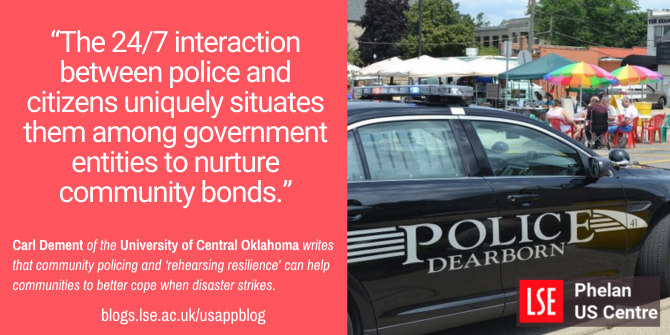 Disasters are an often-unavoidable occurrence in many US communities, and more resilient communities are more likely to return to normal more quickly following such events. Carl Dement looks at the role of community policing in “rehearsing resilience”. He writes that by strengthening networks, building partnerships, solving problems proactively and acting as ‘brokers of resilience’ within communities, community policing can enable a deeper sense of citizenship which in turn helps them negotiate challenges during times of crisis.
Disasters are an often-unavoidable occurrence in many US communities, and more resilient communities are more likely to return to normal more quickly following such events. Carl Dement looks at the role of community policing in “rehearsing resilience”. He writes that by strengthening networks, building partnerships, solving problems proactively and acting as ‘brokers of resilience’ within communities, community policing can enable a deeper sense of citizenship which in turn helps them negotiate challenges during times of crisis.
Throughout history, both natural and human-induced disasters have disrupted communities, challenging their social, political, and economic fabrics. Events such as 2018’s Hurricane Harvey, exemplify the disruptive force of such hazards. However, tragedy can provide the opportunity to build resilience restoring not only normalcy but also fostering growth within communities.
In the context of community life, disaster resilience is not a passive quality; it is a dynamic force demanding continual practice, preparation, and the nurturing of adaptive capacity. This is where the close relationship between community policing and disaster resilience emerges, presenting a narrative of collaboration, empowerment, and a unique concept—rehearsing resilience.
In communities where there is a strong sense of unity, or community spirit, the binding force of shared cultural traits gives rise to social capital – an invaluable resource facilitating cooperation, collaboration, and mutual support. Indeed, Mark VanLandingham’s research within the Vietnamese immigrant community in post-Hurricane Katrina New Orleans revealed a remarkable level of resilience for this very reason. This community worked together to overcome the problems of immigrating to the US prior to Katrina which included finding childcare, work, a church that spoke their language, and learning English. These collective problem-solving experiences built a network of relationships and shared resources – social capital – prior to the onset of Katrina. Put another way, being resilient in the face of new immigrant problems was a resilience rehearsal that served them well after the devastating impact of 2005’s Hurricane Katrina.
The Dynamics of Community Policing
Community-oriented policing (COP) goes beyond mere crime response; it engages citizens, forms partnerships, and catalyzes problem-solving efforts. This approach resonates with the ideals of resilience, fostering social connections, enhancing adaptability, and cultivating a sense of agency within communities. Unlike the conventional model of policing, community policing involves officers becoming integral parts of the communities they serve, and building relationships that extend beyond law enforcement functions. As a bridge between government, citizens, and organizations, community-oriented police departments are uniquely positioned to facilitate the building and “rehearsal” of resilience. Indeed, many emergency managers – those responsible for preparing communities for disasters – are embedded within municipal police departments.
Community policing strives to build and strengthen networks. By forging partnerships with community organizations, local businesses, and civic entities, police departments foster a collaborative environment that is vital for both community resilience and the effectiveness of community policing. The resulting stakeholder networks play an integral role in the process of building social resilience, creating a robust ecosystem capable of facing unknown or unexpected hazards.
Through proactive problem-solving and collaborative approaches, law enforcement agencies actively address challenges, promoting adaptive capacity and innovative solutions. Indeed, the COPs Office of the US Department of Justice recently allocated $5 million for micro-grants to be used by police for community problem solving. For example, the city of Hayward, California used a COPs Office micro-grant to fund new software giving residents, businesses, and employees an improved method for reporting blight issues. This tool has proven useful for cross-department collaborations within the city to address the problem. Such collaborations serve as valuable rehearsals, preparing communities to navigate unexpected hazards and challenges with adaptability. By “rehearsing resilience,” COP becomes an instrumental force in fostering a culture of disaster preparedness.

“Dearborn Police Department Display at th” (CC BY-NC-ND 2.0) by Michigan Municipal League (MML)
Rehearsing resilience and enabling communities
The synthesis of community-oriented policing (COP) and disaster preparedness amplifies the role of police as brokers of resilience, facilitating the rehearsal of response to both anticipated and unforeseen challenges. In essence, “rehearsing resilience” represents a powerful union of forces equipping communities to endure the impact of hazards.
Central to the COP and disaster resilience partnership lies the strategy of engaging communities in policy making and planning—a mechanism empowering community members to shape their own destinies. Community policing is by nature inclusive. By involving community members in policymaking and planning processes, the police can lay the groundwork for a participatory approach to resilience-building. For example, the city of Vallejo, California engaged residents in almost 1,200 community events over three years which lead to partnerships between these citizens and their police. This approach goes beyond the realm of law enforcement, enabling communities to become co-creators of solutions addressing both crime and disaster-related challenges.
The strategy of engaging communities in policy making and planning resonates with the essence of resilience—preparing for the unexpected, harnessing collective wisdom, and adapting to changing circumstances. By empowering communities to play an active role in decision-making, community policing bridges the gap between law enforcement and society, transforming police into facilitators of dialogue, cooperation, and shared responsibility. This approach not only augments social resilience in the face of challenges but also nurtures a deeper sense of citizenship and belonging. As community members contribute to policy decisions affecting their lives, a bond is forged, cultivating a resilience that thrives in the face of adversity.
Problem solving to negotiate challenges
Community policing excels in proactive problem solving, a core tenet of resilience. By identifying challenges and vulnerabilities, law enforcement agencies proactively initiate collaborative efforts to develop strategies enhancing adaptive capacity. This capacity empowers communities to dynamically respond to changing circumstances, harnessing their existing skills and resources to devise unique solutions. These efforts become a rehearsal for qualitative surprises – events or outcomes that are unexpected and difficult to explain by existing theories or models of reality – crucial exercises for building resilience. Indeed, the US Department of Justice created the Herman Goldstein Award to recognize police who collaborate with the community in developing innovative, effective, and measurable solutions to specific problems. Through these collaborations, community members not only address immediate issues but also cultivate and rehearse the skills necessary to navigate future challenges with agility and resourcefulness. The 24/7 interaction between police and citizens uniquely situates them among government entities to nurture community bonds. This continuous engagement can foster familiarity, trust, and mutual understanding. These relationships—forged during times of stability—are tested during crises, demonstrating their significance in the face of adversity.
- This article is based on the paper, ‘Rehearsing resilience: Leveraging community policing to build disaster preparedness’, under review in the International Journal of Disaster Risk Reduction. Read the version at the SSRN.
- Please read our comments policy before commenting.
- Note: This article gives the views of the author, and not the position of USAPP – American Politics and Policy, nor the London School of Economics.
- Shortened URL for this post: https://bit.ly/3HG3piM






